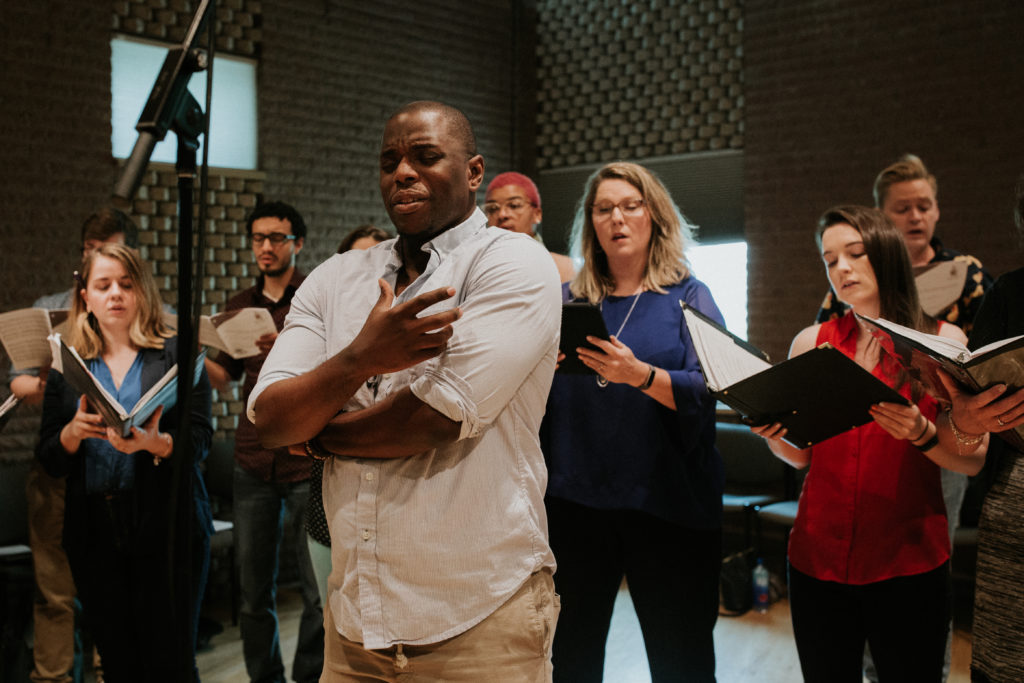
All too often for artists, there’s no place as hard to make a big break as your hometown.
Nashville native Patrick Dailey is an opera singer who has performed internationally to great acclaim, but a few years ago, he made Music City his home base once again. And now, after several years of singing, teaching and collaborating here, Dailey is making his performance debut with the Nashville Symphony’s as a soloist in Handel’s Messiah.
Like most opera singers, Dailey had imagined a life based in a big city, like New York. It was a suggestion from his mother that brought him back to Nashville for what he thought would be a brief rest period. But he ended up truly investing himself in the musical community here.
He’s now a voice professor at TSU, leading their Big Blue Opera Initiative. He founded a choir made up of Black, classically trained singers and created the Harry T. Burleigh Festival to celebrate the legacy of spirituals. He’s on the board of several arts organizations and an active member of Early Music City.
Dailey says home turned out to be the right place to “breathe, collect, reflect and reset,” especially because Nashville played such a role in his becoming a musician in the first place.
Growing up, he took in the sounds of groups from TSU, like the Aristocrat of Bands and the Meistersingers, as well as Dr. Bobby Jones and The Nashville Super Choir. He was surrounded by music at the Friendship Missionary Baptist Church and Salama Urban Ministries.
“The reason why I started studying voice is because I wanted to be a Fisk Jubilee singer, actually,” Dailey says. “And so that sparked my love of sort of the Black classical idiom. It also sparked my love of the Negro spiritual.”
Above all, the name Dailey keeps bringing up is that of Dr. William Crimm.
Today, he and Crimm serve together on the voice faculty at TSU. Nearly 20 years ago, Dailey was a teenager taking lessons from Crimm, singing spirituals like “Deep River,” as well as an aria from Handel’s Messiah that’s usually sung by a woman.
Singing “O thou that tellest good tidings of Zion” under Crimm’s direction, Dailey discovered and began to develop his voice as a countertenor: a male singer who performs in the range usually associated with alto or even soprano voices.
“The way he taught it, my interpretation of it,” Dailey says, “that technique of everything has really stayed with me and sustained me throughout my entire career.”
Which brings us to this weekend. Dailey has sung The Messiah many times, in many places, but never the Schermerhorn Symphony Center — until now.
“It’s just really awesome to be able to be on the largest classical music stage — arguably, the largest music stage — that our city has to offer, singing this work that I’m very familiar with, that is very grounded in my body.”
In this weekend’s performances, along with all the other work he’s doing in Nashville, Dailey hopes to help people feel seen as an openly gay, Black man with a relatively rare voice type. And he hopes that he can expand the artistic palate of the community as a whole, and of people’s perceptions of Black artists.
Dailey wants audiences to know that, as much as he enjoys and values gospel, R&B and hip hop, that’s not all musicians of color have to offer.
“We sing everything. We make everything. We compose, we write, we create, we dance, we act,” he says. “Whatever it is, we can do it all.”
During its run, Nashville Public Radio’s show Live in Studio C featured Dailey many times. You can hear him (and his students) sing in these episodes:

